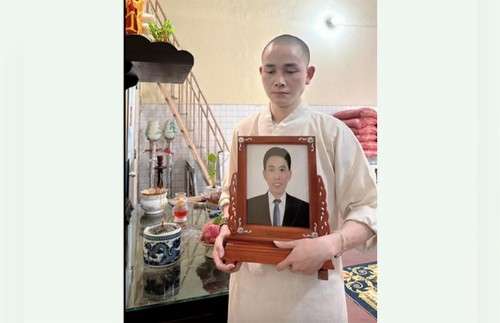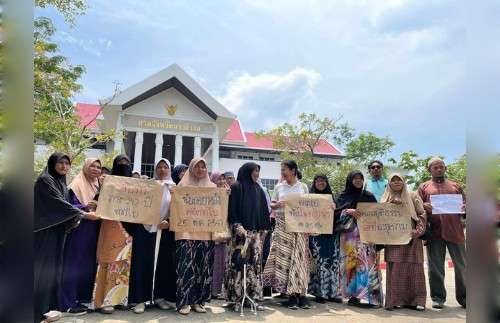Daud Khattak and Carl Schreck

The wedding picture shows Rimsha in a white bridal gown and tiara posing with her new Chinese husband in front of a curved staircase, their thumbs and forefingers joined in the shape of a heart. The caption reads, “Endless love.”
The marriage of the 27-year-old Pakistani Christian and her Chinese suitor here in Lahore last fall was seen by relatives both as a chance for Rimsha to find marital bliss and to boost her family’s financial fortunes.
Her mother, Parveen, said the marriage agency that arranged the union claimed the bridegroom operated a factory, and that Rimsha’s brother could go to China as well to get a “good job” and send money home.
“We thought that our daughter will be happy, and they promised a happy life for the family,” Parveen told RFE/RL in a recent interview in her cramped, one-story home in a Christian neighborhood where children play cricket in the narrow streets.
“We were also overcome by greed,” Parveen added.
The family’s dream of lifting themselves from the hardscrabble existence typical of Pakistan’s marginalized Christian minority has now morphed into a nightmare. Rimsha, who is still in China, claims her Chinese husband is using and physically abusing her.
The family’s dream of lifting themselves from the hardscrabble existence typical of Pakistan’s marginalized Christian minority has now morphed into a nightmare. Rimsha, who is still in China, claims her Chinese husband is using and physically abusing her.
“He is asking me to have sex with all his friends visiting the place to earn money. He is beating me when I refuse. Please help me,” Rimsha said in a tearful video sent to her family via a messaging app in early June.
Rimsha, whose full name is being withheld by RFE/RL, is among the scores of Pakistani women — primarily Christians from poor families in the eastern Punjab Province — allegedly luredinto marrying Chinese men under false pretenses and forced into prostitution.
Pakistani authorities in May arrested dozens of Pakistani and Chinese nationals on suspicion of arranging such marriages in order to force the targeted women into the sex trade, with some alleged victims claiming they were threatened with having their organs removed.
China, a key security and economic partner for Islamabad that has poured billions of dollars into the China-Pakistan Economic Corridor (CPEC), has publicly denied or downplayed the reports of the abuses. “These are lies that Pakistani girls are being trafficked to China for forced prostitution or the sale of organs,” the Chinese envoy in Islamabad tweeted in May.
AP quoted two unidentified Pakistani officials as saying last month that senior officials in Islamabad had ordered the authorities to remain tight-lipped about the trafficking issue over fears of damaging relations with Beijing.
The tensions come against the broader backdrop of a rising demand for foreign brides in China, where the government’s decades-long “one-child policy” along with a cultural preference for boys has resulted in a heavy gender imbalance.
Saleem Iqbal, a Pakistani Christian activist who has spearheaded efforts to bring alleged victims home from China, tells RFE/RL the Chinese and Pakistani governments had not done enough to find and return the allegedly trafficked brides since the spate of arrests in May.
“Investigations are under way, and there will be more arrests,” says Iqbal, adding that around 50 girls and young women have been returned to Pakistan from China. “But the Pakistani government and human rights organizations should raise
their voices and bring the girls back.”
‘I Keep Crying And Refuse’
In a second video obtained by RFE/RL, another Pakistani Christian woman currently in China claims her Chinese husband has abused her and tried to force her to have sex with other men. In the video, Maryam tells Iqbal that her husband has beaten her with a rod and choked her. She points to a scar on her neck as evidence of the abuse.
“When I was in Pakistan, he behaved well. But after arriving here he started beating me. Look, here I have a scar. He is inviting men here and asks me to have sex with them. I keep crying and refuse, and then he beats me,” Maryam, 17, tells Iqbal in the June 3 video chat.
Maryam, who says she moved to China in early 2019, claims that when she asks to return to Pakistan her husband threatens to have her kidneys removed and kill her.
Maryam is from Kasur, 50 kilometers south of Lahore. Her father, Ishaq, is a day laborer who paints houses and lives in a dusty Christian neighborhood in the city. Ishaq says that his older sister encouraged her marriage to a Chinese man due to the material benefits.
“In our community, we have to arrange a dowry, but the Chinese do not ask for a dowry. Your daughter will live a better life and she will be sending you money from China every month. But nothing as such happened,” Ishaq says. He says he received money for the marriage but declines to say how much.
He says the wedding was held at a hotel in Lahore, but that the family has no documents confirming the marriage. Ishaq says both he and his daughter are illiterate and that he does not know the name or age of his son-in-law, whom he met for the first time on the wedding day, nor does he know where in China his daughter is living.
When he speaks to Maryam on the phone she cries and “seems terrified,” Ishaq says.
He adds they were also told that Maryam’s husband was a Christian, although in reality he was not. Both Pakistani Christian and Muslim women have said their Chinese bridegrooms assured them they were wealthy and of the same faith, only to discover after arriving in China that they were neither.
Two young Pakistani Christians who married Chinese men but did not go to China told RFE/RL that the bridegrooms toted Chinese translations of the Bible around with them but appeared to know little about Christianity.
‘All Expenses Will Be Paid‘
The poverty-stricken existence that Pakistani Christians largely lead leaves young women in the community particularly vulnerable to predatory marriage scams, Iqbal says. “They know that they are voiceless people, they are poor, and it is easier to target them. No one will pay heed to their voice,” he says..

Last winter, a banner festooned across a road in a Christian neighborhood of Lahore read: “Attention Christian People: matrimonial relations needed for deserving, poor, and noble families in China. All expenses will be paid by Chinese families. No education needed.” RFE/RL recently called the phone number listed on the banner, but it was disconnected.
One of the suspected ringleaders of the alleged gang under investigation in Pakistan is a man named Anas Butt, the son of a retired police officer in the Punjab region. Several of the women who say they were duped into the marriages identified Butt, who has been charged but remains at large, as a central player in the alleged scam — and that he regularly hurled abusive language at Christian girls.
In a recording of a phone call obtained by RFE/RL, a man said to be Butt is heard arguing with a woman over access to a mobile phone and telling her that “people won’t even spit” on Christians. Repeated attempts by RFE/RL to reach Butt by phone were unsuccessful.
Azra, a Christian mother of nine who also lives in Kasur, says her 15-year-old daughter Sawera at first refused to marry the Chinese suitor who twice came to their home with associates, even after they told her he owned a jewelry business and three houses, and that he would help her family financially.
“When they visited for the third time, we agreed to the marriage. We arranged the marriage and then they would send cars to invite us to Lahore or Islamabad. But they did not give us anything that they promised,” Azra said in a recent interview.
Like Ishaq, Azra said she did not know the name of her daughter’s husband or where in China they live. The couple married in November and moved to China in January, she added. In telephone conversations, her daughter has told her that her husband is pressuring her to do sex work to compensate for the money that was spent for the marriage, and that they will let her go after that, Azra told RFE/RL.
Her daughter says she suffers beatings when she refuses. “We are getting disturbed when we listen to her.”
‘Disturbing Pattern’
The sex-trafficking and abuse allegations by Pakistani girls and women could not be independently corroborated by RFE/RL. China says it is cooperating with Pakistani authorities to combat crimes “under the banner of…cross-border marriage” but dismissing the sexual-exploitation accusations — which Pakistani authorities themselves have lodged — as “fabricated facts” and “rumors.”
“According to investigations by the Ministry of Public Security of China, there is no forced prostitution or sale of human organs for those Pakistani women who stay in China after marriage with Chinese,” the Chinese Embassy in Islamabad said in May.
“We will never allow a few criminals to undermine China-Pakistan friendship and hurt the friendly feelings betweeni two peoples,” the embassy added.
A week before Pakistani authorities arrested numerous suspects in the sex-trafficking case related to the marriage brokers, Human Rights Watch (HRW) said Islamabad should be “alarmed by recent reports of trafficking of women and girls to China.”
“These allegations are disturbingly similar to the pattern of trafficking of ‘brides’ to China from at least five other Asian countries,” HRW said.
RFE/RL spoke to five other young Pakistani Christian brides who managed either to return home from China or avoid moving there after learning something was amiss with their marriages. Among these, only Natasha Masih, a 23-year-old from Faisalabad, alleged that she was beaten and coerced into the sex trade.
Natasha’s parents arranged the marriage in the hopes of getting a new home and financial support for their family of eight. She said that after arriving in China, her husband moved her to a hotel in the city of Urumqi and forced her to work as a prostitute there.
“He was torturing and beating me after shifting me into the hotel room. He was calling other men and forcing me to do bad things,” she told RFE/RL following her recent testimony at a court hearing in Faisalabad in a criminal case related to the marriage of a Pakistani woman to a Chinese man.
Masih said she escaped thanks to a Pakistani student in China related to a member of her parents’ church congregation back home. The congregation members contacted the student and had him spirit Natasha away after contacting her husband and posing as a client, she said.
Naina, an 18-year-old from Lahore, told RFE/RL that her marriage was arranged by her parents in exchange for money without her knowledge. She said she lived in China for four months and that she was kept “as a servant” and made to work “all day.” She said she “politely” persuaded her 35-year-old husband to let her visit Pakistan, and then never returned.
“My parents wanted me to go back, but I did not want to spoil my life,” Naina said.
While Naina and the three other Pakistani brides interviewed by RFE/RL said they were not sexually exploited in China, several said others in similar situations like them had told them via messaging apps that they were being abused and forced into prostitution.

“I Want My Daughter Back’
Rimsha, the 27-year-old who sent the tearful video message to her family in Lahore, twice called police after she was advised to do so by other Pakistani women in China that she communicates with, her mother, Parveen, told RFE/RL.
But Rimsha claimed her husband paid off the police so they would go away, Parveen
and Rimsha’s sister, Jameela, said. “After that, the husband snatched her mobile phone,” Jameela said, adding that her sister was only allowed to use the phone to take incoming calls from her family.
Parveen said she had suffered health problems due to her daughter’s situation and her concerns about how — or whether – Rimsha might return. She appeared regretful about the financial considerations that led to her daughter’s marriage.
“We became greedy, and we had no idea that there would be such problems later on,” Parveen said.
“Now I want my daughter back.”
Muhammad Zawar and Siraj Zaheer of RFE/RL’s Radio Mashaal contributed to this report
Copyright (c) 2019. RFE/RL, Inc. Reprinted with the permission of Radio Free Europe/Radio Liberty, 1201 Connecticut Ave NW, Ste 400, Washington DC 20036










